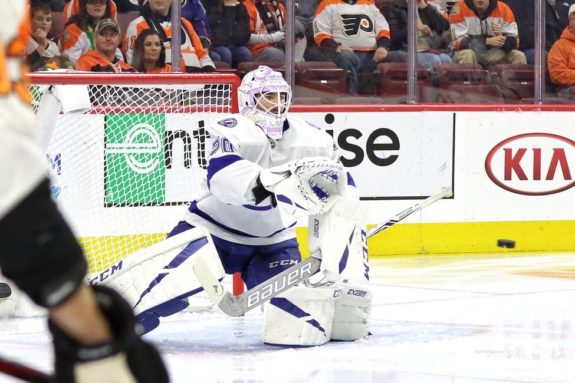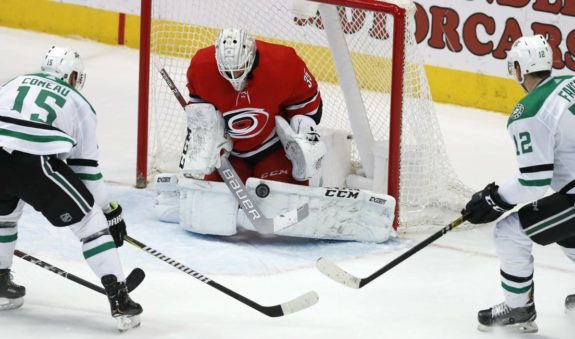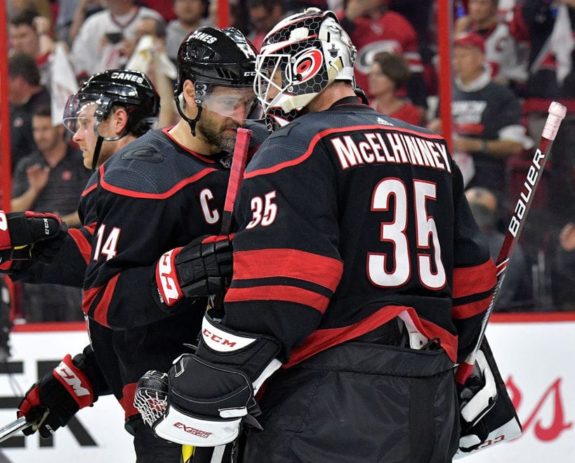The Tampa Bay Lightning cleaned up at the NHL awards as forward Nikita Kucherov took home three trophies and goaltender Andrei Vasilevskiy was selected as the Vezina Trophy winner, which is awarded to the league’s best netminder. Vasilevskiy was great last season, but what may have gone unnoticed was the play of backup goaltender Louis Domingue.
While Vasilevskiy missed time with a broken foot, Domingue played some of the best hockey of his career. However, this offseason, the Lightning decided to sign two more goalies, Curtis McElhinney and Scott Wedgewood. Wedgewood will likely be with the AHL Syracuse Crunch for much of the time, but McElhinney has a two-year contract worth $1.6 million per year.
Related: Lightning Will Survive Without Vasilevskiy
Both Domingue and McElhinney are established NHL goalies, and if Wedgewood plays well, it’s possible he too could see time as the backup with the Lightning. Is it possible the Lightning have too many NHL-caliber goaltenders?
By the Numbers
Louis Domingue
Last year was Domingue’s second season with the Lightning and was arguably the best of his career. He had a 21-5-0 record with a .908 save percentage (SV%) and a 2.88 goals-against average (GAA). According to Hockey-Reference, the league averages were a .910 SV% and a 2.81 GAA. Domingue was just worse than those numbers.

One number that stands out is Domingue’s quality start percentage. At .538, it’s exactly league average, so in reality, he is a league average goaltender in almost every sense. What helped him to 21 wins was a Lightning offense that was one of the most potent in the league last season. The Lightning led the league in goals scored per game at 3.9, almost half a goal better than the next closest team (Calgary Flames). If the Lightning were a league-average offense, Domingue would not have looked nearly as good last season.
Curtis McElhinney
McElhinney has been around the league a long time — seven teams in 11 years — but in his last two seasons with the Toronto Maple Leafs and Carolina Hurricanes, McElhinney has averaged a .923 SV% and a 2.36 GAA in 51 games. Those are outstanding numbers for a guy who’s heading into his age-36 season, and he’ll be even better in a backup role.
Related: Hurricanes’ Calm Curtis McElhinney
As a 1A option with the Hurricanes last season, McElhinney had 20 wins in 33 games, and he also tallied a 3-2 record in five Stanley Cup Playoff games. He backstopped the Hurricanes to three wins against the New York Islanders in which he gave up a combined five goals. He only allowed two goals in Game 3 of the Eastern Conference Final against the Boston Bruins, but took the loss. The Bruins lit the lamp four times in their Game 4 victory to sweep the Hurricanes.

In those five playoff games, McElhinney’s total numbers included a stellar .930 SV% and a 2.01 GAA. Those were the numbers that likely stood out to Lightning general manager Julien BriseBois and compelled him to sign McElhinney.
Scott Wedgewood
Wedgewood’s last game in the NHL was in 2017-18 with the Arizona Coyotes, and his numbers as a whole in the NHL are nothing special, albeit a small sample size. Through 24 games played, Wedgewood has a .903 SV% and a 3.05 GAA. However, last season with the AHL’s Rochester Americans, Wedgewood posted a .908 SV% and a 2.68 GAA. Those numbers are encouraging to the Lightning organization and will be good for their AHL affiliate, the Syracuse Crunch.
Wedgewood seemed to be more of an AHL signing, but if he’s able to impress the Lightning coaching staff in training camp, they will remember that if Domingue or McElhinney start to struggle or get injured. The Crunch’s success is important for the organization as some of those players will be the future of the Lightning organization, and they wouldn’t have signed Wedgewood if they didn’t believe he could help them perform at the highest level.
What Will the Lightning Do?
Vasilevskiy is the guy, there’s no question about that. But, of the three possible backup options, the Lightning will likely go with Domingue and McElhinney as the backup, but the big question for the Lightning is whether or not they will go with three NHL goalies.

Last season, the Philadelphia Flyers and Columbus Blue Jackets carried three goalies at one time, and as David Marcoux of NHL.com says, handling three goalies “can be priceless if managed properly.” Vasilevskiy is an elite goalie and there are no questions about his performance. McElhinney proved that he’s still got game, even at an advanced age, and Domingue showed what league average goaltending can do on an elite offensive team. However, carrying three goalies on the Lightning roster doesn’t make sense at this point in time.
The Lightning should send Wedgewood to Syracuse where he will get to play at least every other game, and in training camp, the Lightning staff will let McElhinney and Domingue battle it out for the backup slot. Solely based on the numbers and experience, McElhinney has to be the ideal option. His numbers in the regular season were strong enough to help the Hurricanes win, and his performance in the playoffs are arguably what earned him his contract with the Lightning.
Domingue essentially does not have any playoff experience and his contract is up at the end of the season. McElhinney is making $1.3 million this season and next, but since Domingue will be an unrestricted free agent, he could be a nice addition in a trade package when the Lightning need some additional firepower elsewhere. If Domingue is the starter with the Crunch for most games and either McElhinney or Vasilevskiy get hurt, he will be ready to go rather than trying to find his rhythm in the crease when he’s called upon.
The Lightning should go with two goaltenders to start next season, and they should be Vasilevskiy and McElhinney. But, as the playoffs roll around and rosters start to expand, don’t be surprised if a third goalie makes his way to the Lightning as an insurance policy.